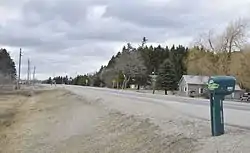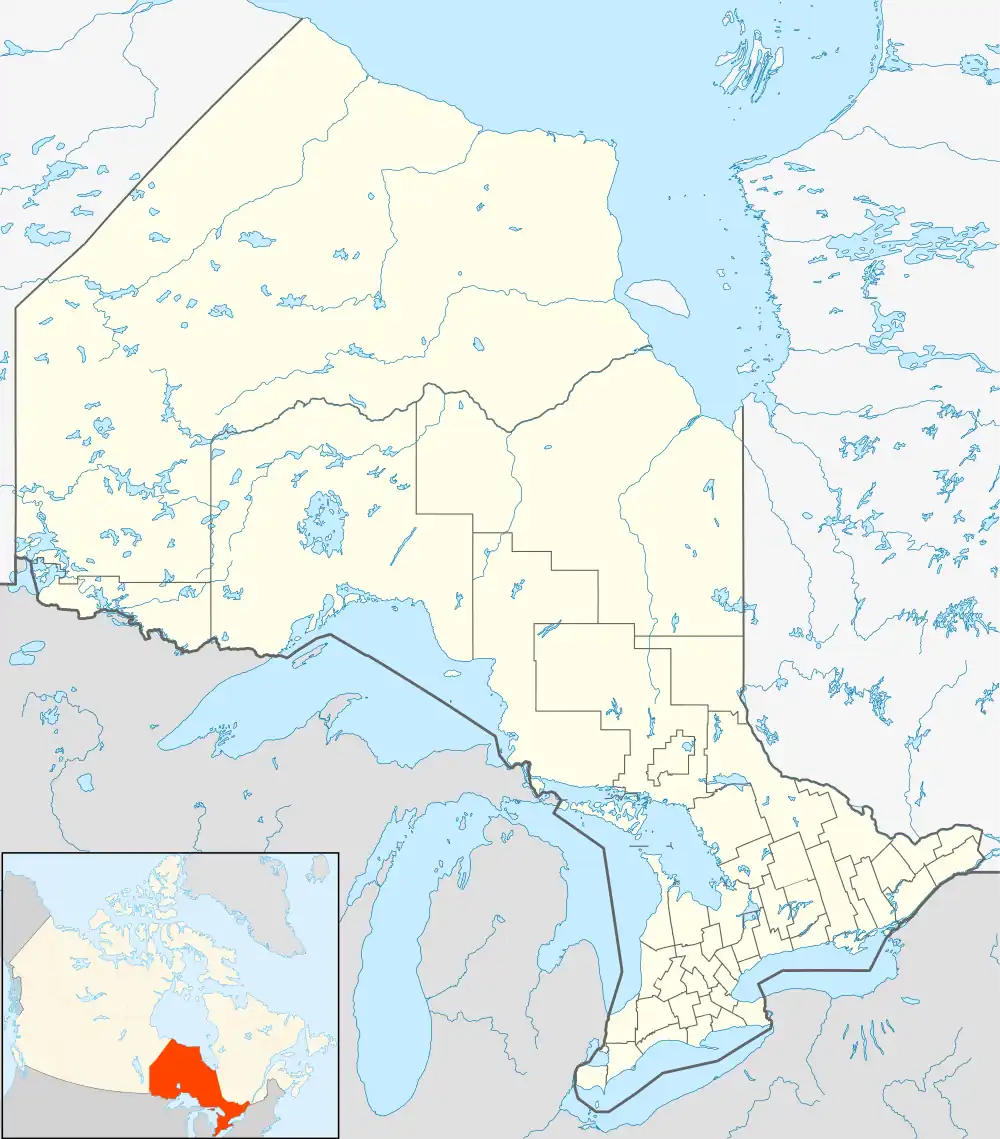Cumnock, Ontario | |
|---|---|
Unincorporated rural community | |
 Highway 6 in Cumnock | |
 Cumnock, Ontario  Cumnock, Ontario | |
| Coordinates: 43°45′35″N 80°27′25″W / 43.75972°N 80.45694°W | |
| Country | Canada |
| Province | Ontario |
| County | Wellington |
| Township | Centre Wellington |
| Time zone | UTC-5 (Eastern (EST)) |
| • Summer (DST) | UTC-4 (EDT) |
| GNBC Code | FAUXS[1] |
Cumnock is an unincorporated rural community in Centre Wellington Township, Wellington County, Ontario, Canada.[1][2] Cumnock was part of Nichol Township until 1999.[3][4]
The settlement is located on Highway 6, 9 km (5.6 mi) northwest of Fergus.
Once a thriving rural community, little remains of the original settlement.
History
.jpg.webp)
James Samson, a Scottish immigrant, purchased 7,367 acres (2,981 ha) of land in the area in 1852. Samson built a general store and tavern along the Owen Sound Road (now Highway 6), and named the settlement after his hometown of Cumnock, Scotland.[6][7] A post office was established in Samson's store in 1855, with Samson as postmaster.[8]
In 1855, Richard Gluyas laid out Gluyasville a short distance north of Cumnock. Gluyasville was eventually absorbed by Cumnock.[7]
The Wellington, Grey and Bruce Railway built a line through Cumnock in 1871, and a station was built there.[9][10] That same year, Cumnock was noted as having a saw mill, a wagon maker, and two hotels (the British Hotel and the Red Lion).[10] The Red Lion Hotel was owned by Scottish immigrant John Muir, who "went back to Scotland several times to bring back wives to Cumnock".[6]
The Cumnock Methodist Church was built in 1877.[11]
Cumnock was noted as having a cheese factory in 1880.[12]
Decline
At its peak, Cumnock had a population of 200, though by 1908, the settlement had one hotel, two stores, two churches, and a population of 86.[6][13]
The post office closed in 1915, and the Methodist church closed in 1924.[8][11]
An author writing in 1933 described the northern boundary of Nichol Township "where Cumnock used to be",[14] and by 1969, Cumnock was no longer listed on provincial maps.[6]
The railroad line through Cumnock was eventually taken over by Canadian National Railway, and was abandoned in 1983.[9][10]
Cumnock Tract
In 1964, the County of Wellington purchased two parcels of forested land at Cumnock for recreational use. Located within the westernmost parcel is the Cumnock Tract, a 1.5 km (0.93 mi) walking trail.[15]
Notable people
- James Ross, farmer and member of the House of Commons of Canada.[16]
References
- 1 2 "Cumnock". Natural Resources Canada. October 6, 2016.
- ↑ "Centre Wellington". Statistics Canada. November 2, 2016.
- ↑ "Restructuring Flashnews Municipal Restructuring Summary Table". Ontario Ministry of Municipal Affairs. Archived from the original on April 19, 2017. Retrieved May 22, 2017.
- ↑ The Province of Ontario Gazetteer and Directory. Robertson & Cook. 1869. pp. 126.
- ↑ "Cumnock General Store/Post Office". Wellington County Museum and Archives. Retrieved May 22, 2017.
- 1 2 3 4 "Local Resident Compiles the History of Cumnock". Arthur Enterprise News. October 7, 2010.
- 1 2 Rosenthal, Max (February 1965). "Early Post Offices of the Fergus District" (PDF). BNA Topics. British North America Philatelic Society. 22 (2): 37–39. Archived from the original (PDF) on 2017-07-03. Retrieved 2017-05-22.
- 1 2 "Cumnock". Library and Archives Canada. May 27, 2014.
- 1 2 "The Wellington, Grey & Bruce Railway". Trainweb. December 30, 1997.
- 1 2 3 Gazetteer and Directory of the County of Wellington, for 1871-2. A. O. Loomis & Co. 1871. p. 72.
- 1 2 Russell, Ken (July 12, 2002). "Cumnock Methodist Church". Rootsweb.
- ↑ Report of the Commissioners [and Appendices A to S]. Vol. 2. Ontario Agricultural Commission. 1880. p. 632.
- ↑ Lovell's Gazetteer of the Dominion of Canada (PDF). John Lovell & Son. 1908. p. 418.
- ↑ Templin, Hugh (1933). Fergus: The Story of a Little Town. Fergus News-Record. p. 27.
- ↑ "Wellington Walks 2013" (PDF). County of Wellington. 2013.
- ↑ Day, Frank (1953). Here and There in Eramosa. Leaman. p. 194.